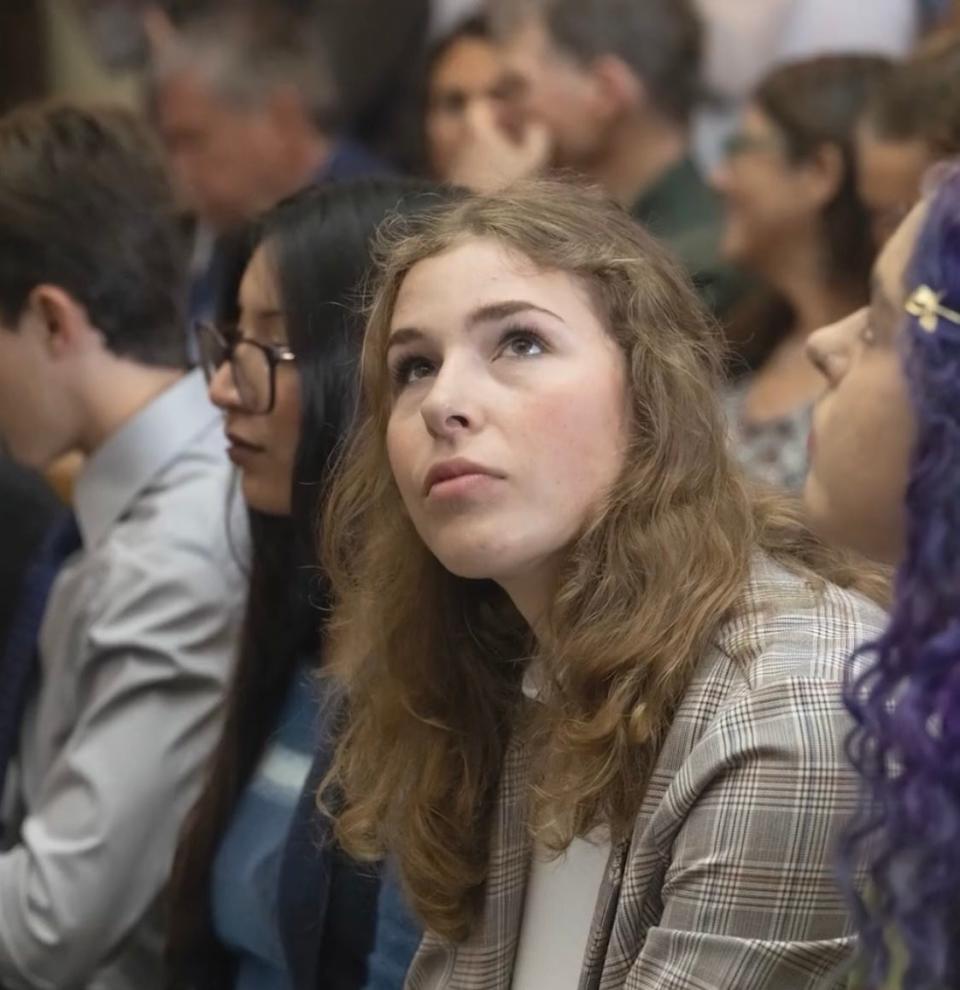UNH student-athlete and youth in Montana take on state over climate change — and win
DURHAM — Georgianna Fischer, then a high school senior, wrote a December 2019 letter to the editor to her hometown newspaper in Montana, the Bozeman Daily Chronicle, calling for environmental action in response to climate change.
“We have a problem: The weather outside feels like late March. It saddens me to look outside and see brown grass underneath dirty, melting snow,” she wrote. “This is not what a Montana winter should look like. Climate change is a dire issue in our present time, and it's not just making the winters warmer. It's creating bigger storms and longer droughts, (rising) sea levels, forcing animals to migrate north, and spreading diseases.”
The letter was a sign of things to come.
Fischer — now a student-athlete at the University of New Hampshire — and a team of other youth environmental activists were on the winning side of a watershed climate lawsuit ruling against their home state.
A judge ruled Monday, Aug. 14 that Montana state agencies’ greenhouse gas emissions and fossil-fuel-promoting laws were harming Fischer and 15 of her young co-plaintiffs, all ranging from 5 to 22 years old, and violating their right to a clean and healthful environment.

The ruling in the Held vs. Montana constitutional climate lawsuit is the first such constitutional decision in the nation’s history.
“I’ve faced a lot of impacts from wildfire smoke, extreme heat and a lack of snow in the winters, and it’s had a mental impact on me,” said Fischer, a rising UNH senior and member of the school’s skiing team. “The future may be drastically different, and these natural landscapes that I love and truly depend on are going to dramatically change in the future if we don’t step in.”
More: A landmark case: In first-of-its-kind Montana climate trial, judge rules for youth activists
Rikki Held, a 22-year-old from Broadus, Montana, was the lead plaintiff in the suit and eldest in the group. The suit was filed against the state, in addition to former Montana Gov. Steve Bullock, a Democrat, and numerous state agencies, including the Department of Environmental Quality, the Department of Natural Resources and Conservation, the Department of Transportation and the Montana Public Service Commission.
Fischer was 17 years old in February 2020, when she joined the lawsuit, filed with the help of attorneys with Our Children’s Trust, the Western Environmental Law Center, and McGarvey Law.
Our Children’s Trust, according to the organization, is the only nonprofit public interest law firm around the globe that offers legal services to youth seeking to secure their legal rights to a safe climate.
Why did Fischer join the lawsuit?
Fischer, who is an environmental science ecosystems major and geospatial analysis minor at UNH, joined the lawsuit after her friend and eventual co-plaintiff Claire Vlases encouraged Fischer to join her.
Not yet old enough to vote in 2020, Fischer thought about preserving the legacy of her great-grandmother Mary "Polly" Renne, who worked to protect national wilderness areas in Montana. She agreed to join the lawsuit.
“Part of the youth climate movement is that people under 18 years old don’t have a say in the legislatures, so protecting our constitutional rights is a pretty important thing,” she said. “It just felt like a good way to make a change.”

The youth-led suit specifically challenged the constitutionality of the state’s former energy policy, which was created in 1993. Though the policy was repealed by the Montana legislature this spring in advance of the Held vs. Montana trial, lawmakers in 2011 added a provision to the former policy calling for increased fossil fuel development while also forming new energy sources.
However, in May, Republican Montana Gov. Greg Gianforte signed into law a bill that bars state agencies from considering greenhouse gas emissions and impacts to climate when conducting environmental reviews of projects and operations.
What does the lawsuit argue?
“The threats posed by fossil fuels and the climate crisis are existential. Science is unequivocal that dangerous climate change is upon us and is occurring due to human activities, primarily from the extraction and burning of fossil fuels,” the lawsuit states. “Additionally, while forests have the potential to sequester significant amounts of carbon dioxide (“CO2”), current forestry practices and activities are not maximizing the sequestration potential of forests and are resulting in significant greenhouse gas (“GHG”) emissions. The release of anthropogenic GHGs into the atmosphere is already triggering a host of adverse consequences in Montana, including dangerously increasing temperatures, changing precipitation patterns, increasing droughts and extreme weather events, increasing the frequency and severity of wildfires, increasing glacial melt, and causing numerous adverse health risks, especially to children.”
The lawsuit describes each plaintiff. The section on Fischer noted she is a competitive Nordic skier who at the time was training 11 months a year, practicing 15 hours each week and competing in junior national competitions.
The plaintiff described a lack of winter snowfall, how snow quickly melts and shortens her training season window and wildfire smoke impacting her ability to breathe due to the impact of greenhouse gas emissions in Montana.
“Georgi sometimes has feelings of despair and hopelessness; she has invested years into a snow-based sport, but understands that snow and the sport may not exist in her future,” the lawsuit states.

Fischer worked with Our Children’s Trust lawyers to prepare evidence, all while wondering whether the young Montanans would ever get their time in court. The state attempted to dismiss the suit multiple times but never prevailed, and the lawsuit went to trial in Helena, Montana beginning June 12.
What does the judge's ruling say?
From the first day of trial to the last on June 20, the youth plaintiffs walked up to the Lewis and Clark County Courthouse to cheering and supportive onlookers. Several, including Fischer, testified during the trial.
Aside from Vlases, it was the first time Fischer had met her co-plaintiffs. When not in court, the group bonded over ice cream at a shop in Helena.
It took nearly two months, but on Monday, Judge Kathy Seeley released her ruling: The plaintiffs had prevailed.
“Plaintiffs’ injuries will grow increasingly severe and irreversible without science-based actions to address climate change. Plaintiffs have proven that as children and youth, they are disproportionately harmed by fossil fuel pollution and climate impacts,” Seeley states in the ruling.
“Montana’s (greenhouse gas emissions) and climate change have been proven to be a substantial factor in causing climate impacts to Montana’s environment and harm and injury to the youth plaintiffs,” the ruling adds. “Plaintiffs have a right to a clean and healthful environment, which includes climate as part of the environmental life-support system.”
Fischer was at the dentist when the news broke of the youth activists’ victory, and she missed a celebratory Zoom call that Our Children’s Trust held with the co-plaintiffs.
“In a sweeping win for our clients, the Honorable Judge Kathy Seeley declared Montana’s fossil fuel-promoting laws unconstitutional and enjoined their implementation," said Julia Olson, chief legal counsel and executive director with Our Children’s Trust in a prepared statement. "As fires rage in the West, fueled by fossil fuel pollution, today’s ruling in Montana is a game-changer that marks a turning point in this generation’s efforts to save the planet from the devastating effects of human-caused climate chaos. This is a huge win for Montana, for youth, for democracy, and for our climate. More rulings like this will certainly come.”
Messages have been pouring in from loved ones and supporters since the ruling was released, Fischer said.
“It’s surreal. I never really expected to be part of something this big. So many people have turned out to support, both on social media and in person, too,” she said. “It’s incredible to see how many lives have been touched by this.”
A spokesperson for the Montana attorney general told the Associated Press the office plans to appeal the ruling.
“A lot of my childhood was spent outside and Montana is a great place for the outdoors,” Fischer said. “I’ve always wanted to protect the environment.”

The UNH student intends to find a job in the environmental science field post-graduation and dive into policymaking.
“This whole process has been incredible and all the support has been truly overwhelming in such a good way,” Fischer said. “I really hope that this can be a positive sign and set a precedent.”
The National Oceanic and Atmospheric Administration reported that last month was the warmest July ever. As July is always the warmest month of the year, the organization noted that last month was “more likely than not” the warmest month on record in world history dating back to 1850.
This article originally appeared on Portsmouth Herald: UNH student-athlete part of winning Held vs. Montana climate lawsuit

